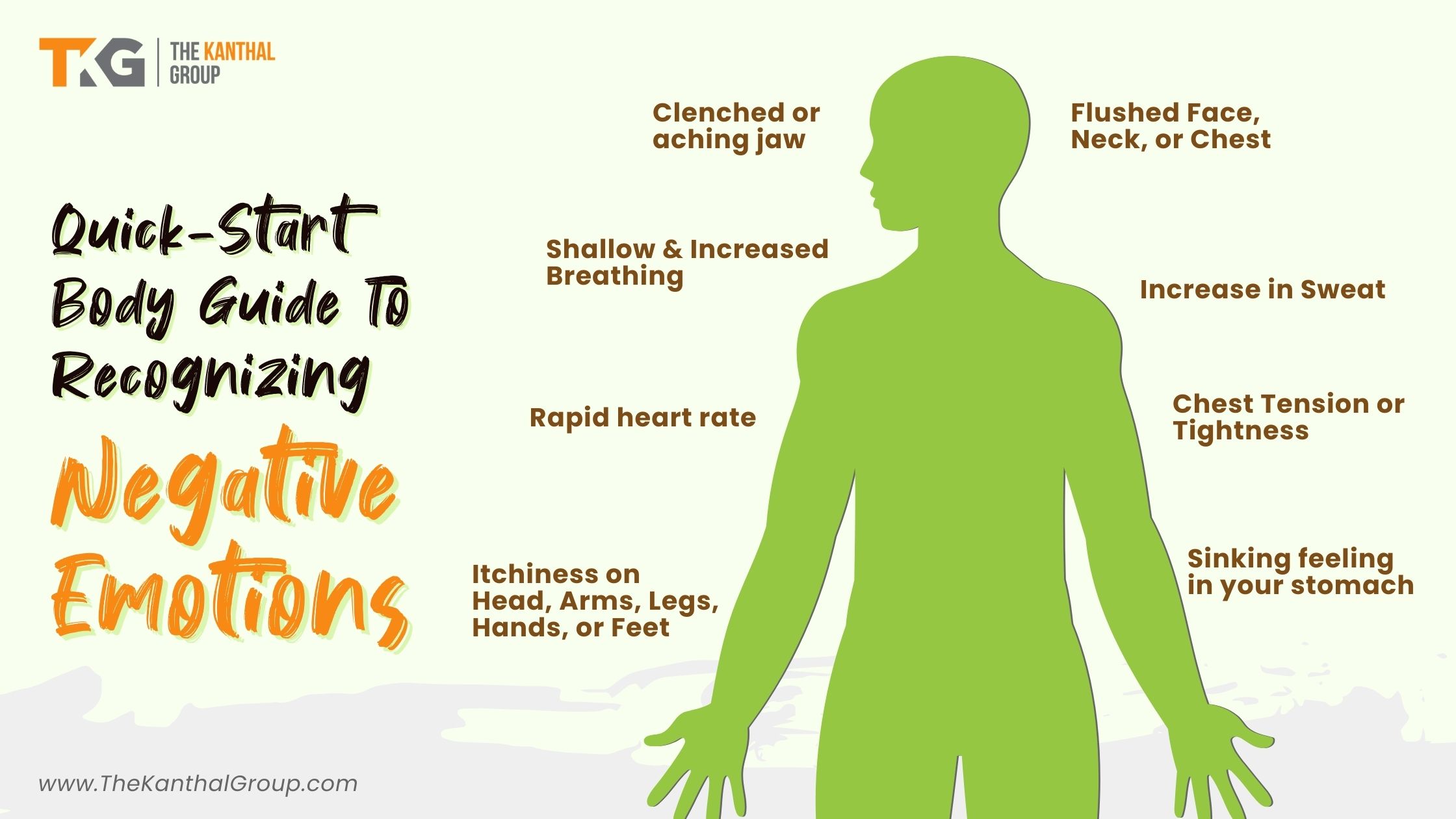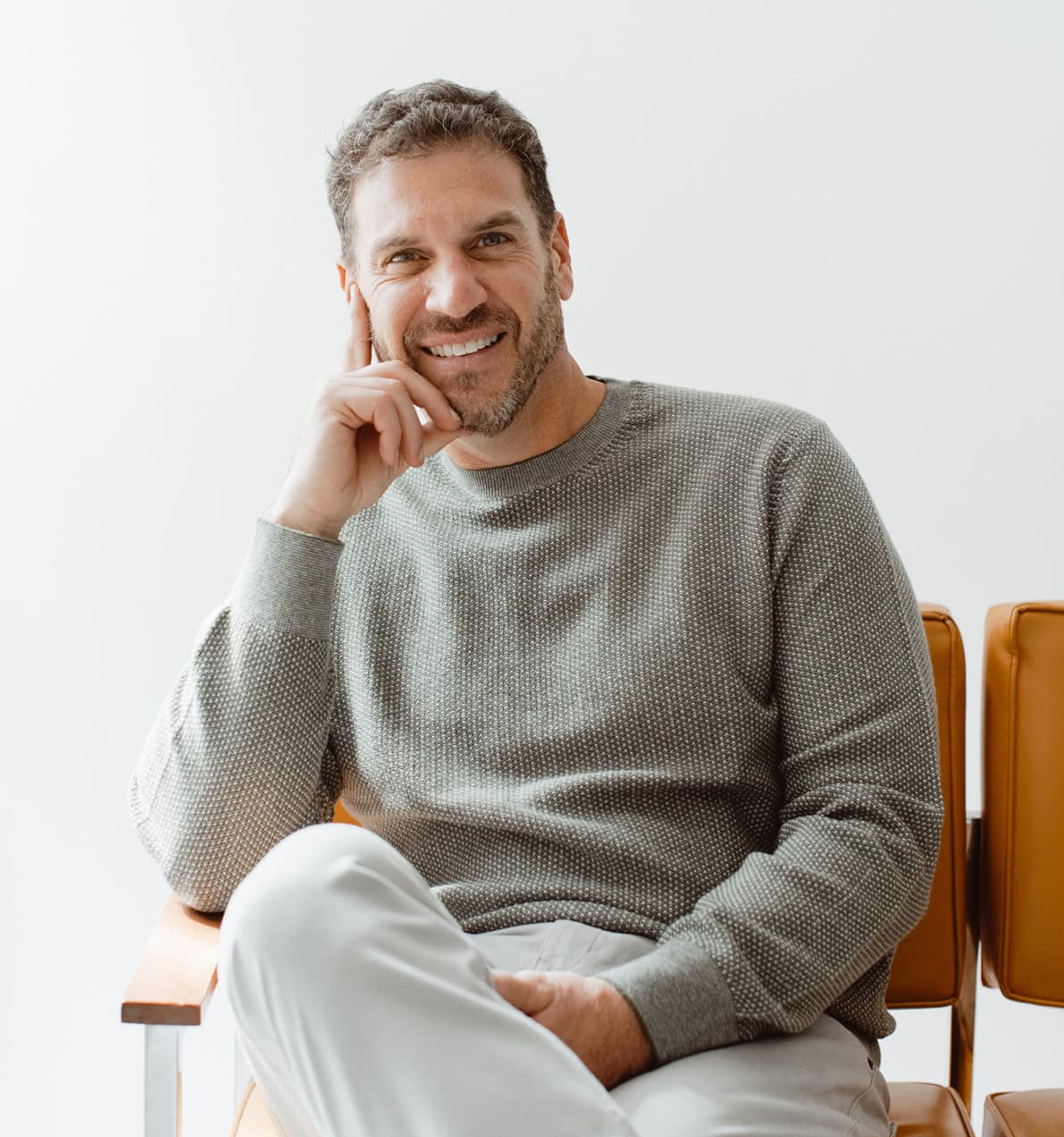An essential part of being a conscious leader is having a deep sense of self-awareness, and one part of that self-awareness is how your body helps you to understand your negative emotions.
What if I told you that approx 80% of the time, your body knows what you’re doing and what you’re feeling before your brain even has a clue?
Yup! According to some studies, that’s exactly what happens.
Often, your body will give you a physical response when you start getting upset, angry, or worked up and if you recognize these cues, you can understand what’s going on, and take steps to understand how you deal with your emotions and ultimately behave, respond, or react to them.
Your body sends you a message, and as a self-aware leader, you listen.
Developing this level of self-awareness can take time, but there are ways to take proactive steps to attune yourself to your emotions and then respond to situations more consciously and intentionally.
But being a conscious leader isn’t just about understanding your own emotions. It’s also about being aware that your actions and words impact others and then taking responsibility for your behavior.
When you can cultivate self-awareness, you can get to a point where your body warns you BEFORE things go downhill. No more blowing up in meetings, retreating when challenged, or putting up that incredibly high wall when you feel threatened! .
Negative Emotions Can Cause Physical Responses
I have a client who has an anxiety-type tic. For a long time she had no idea that touching her neck was an automatic response to negative emotions until her team pointed it out during a heated debate.
Her team said, “Hey, what’s up with that?” but she was baffled. “What are you talking about?” she asked. They told her that when she touched her neck, it meant she wasn’t happy. Boom! Her mind was blown.
After that, she started recognizing what her body was telling her about her negative emotions, and how she was triggered. She even noticed that her neck actually felt hot, and her skin tone changed. This is the deep sense of self-awareness we need in order to invoke conscious leadership.
Recognizing Your Negative Emotions
Understanding and recognizing negative emotions within ourselves is an essential first step toward acceptance and growth.
Our bodies often provide signals or clues to our emotional state, similar to how our stomachs growl when we’re hungry. We can learn to identify and acknowledge our emotions by paying attention to these physical cues.

It’s essential to look out for these bodily signs and take a moment to pause and reflect when we notice them.
In my client’s case, when her neck feels warm, that’s the sign – BEFORE she touches her neck. When my jaw is tight from clenching, that’s the sign of my anxiousness – BEFORE I lose my cool. When we can anticipate an action or reaction by being curious and acutely aware of what our bodies are communicating, we can take a break, reflect and dig deeper.
Am I really angry about this superficial, isolated event or thing, or is there a more profound and concealed issue that requires attention?
Positive Intelligence: The Missing Link

This is where Positive Intelligence (PQ) comes into play. Have you heard of it before? I run some great workshops that delve deep into Positive Intelligence and self-awareness, and there are a few other blog articles you may want to read that go into more detail. What you might not have heard is how and why PQ is so impactful and why I describe it as life-changing and the missing link to my happiness.
Positive Intelligence is a game-changer for pretty much everyone who tries it—including myself! My ‘Judge’ (that little voice inside my head) convinced me I was the lowest piece of shit on the planet. If things went wrong and I was involved, my Judge would pipe up and tell me, “Of course they did – you piece of shit! You’re the reason things are fucked up.” My Judge also convinced me I was unworthy of love, affection, attention, and promotion. Essentially, I felt like a nothing person.
To counteract this self-disgust and sense of unworthiness, I had an insatiable need to prove that i was right.
But here’s the thing. In all those years of fighting to be “right,” I was really trying to feel a sense of worthiness. Instead, I was just behaving like an asshole. I was uncooperative, brash, and aggressive—-what a fantastic set of personal traits!
If only I had known back then that when I clenched my jaw, that was the first sign I was angry. Or when my chest got tight and my heart rate increased, I was feeling anxious. Most importantly, what if I realized that when people challenged me, it wasn’t because they thought I was unworthy but because they knew I could be better?
Nah. Back then, I knew better than everyone! I had that massive chip on my shoulder. I had that worthiness thing to prove.
Practicing Conscious Leadership
Now that I’m older and wiser, I’ve learned to recognize my own cues and clues. I can feel the body sensation, the physiological response that I have ZERO control over, and then assess, determine, and decide what to do with it. Not knee-jerk by being a jerk, but with a total sense of consciousness and open-mindedness.
Sure, I can get angry and that’s perfectly normal. But it’s not okay to bite people’s heads off, curse like a lunatic, and throw a temper tantrum.
Conscious leadership is about further developing and strengthening your sense of self-awareness and thinking about how many emotions you’ll be able to extinguish before they ignite. Think about that the next time your co-worker, vendor, direct report, spouse, child, parent, or friend does THAT thing. When you are self-aware, you’ll be able to navigate tricky situations with a sense of calm and collectedness you’ve never experienced before.
How, you ask? The answer is simple: becoming keenly aware of what your body tells you.
No Need To Fight Every Battle
I recently came across a saying that resonated with me: “I’m here today to cross the swamp, not to fight all the alligators.”
This analogy can be applied to how we deal with negative emotions. The negative emotion itself could be seen as the alligator, but instead of fighting it, we can learn to identify it by the specific body sensation associated with it. By addressing the underlying issue or root cause of that sensation, we can focus on moving forward more effectively, efficiently, and compassionately, creating as many win-win situations as possible rather than fighting every battle.
Keep in mind, crossing the swamp is the big goal and the conscious, self-aware leader knows better than to be distracted by all the alligators.
What Are Your Physical Cues?
To master your body-emotion-mind connection, the first step is awareness. If you’re having trouble recognizing your body sensations or physical responses, don’t hesitate to ask those closest to you and whom you trust the most. Ask them what clues they notice when you’re in a bad mood. This may seem like a “no duh” moment, but it’s crucial. How can you master this connection if you’re unaware of it? DUH!
Once you know your signals, cues, and clues, it’s time to focus on that sensation. Take note of what you feel – is there a tingle or warmth? What’s happening with your eyes? Are you clenching your fists, exhaling audibly, rolling your eyes, or leaning forward? What else can you notice about where in your body you hold the emotion(s)?
Use This Self-Awareness To Start Responding Positively

To bring the work of mastering your body-emotion-mind connection to life, it’s important to vocalize it. For example, you could say, “I’m feeling tightness in my chest, and that’s associated with my negative feelings of anxiety.”
Start by saying this out loud to yourself and see how it feels. Eventually, challenge yourself to say it to others. I sometimes tell my family, “I feel the anger brewing in me,” before I lose my shit. Of course, that’s not an excuse for me to unleash on them—but it’s a clear signal to everyone, including myself, that the current course of events is leading us down a destructive path.
Your Mind-Body-Connection Strengthens With Time
You can engage in focused and deliberate mindfulness and mental exercises as you become more attuned to these sensations. Close your eyes and focus intently on the feeling – what do you notice about your gut, neck, shoulders, back, jaw, hands, feet, chest, etc.? What is the most noticeable sensation?
Simply closing your eyes and breathing intentionally can also be effective. Science has proven that intentional breathing has a calming effect. For those of you who may be hesitant to try it, perhaps you’re not willing to be the conscious leader you think you are. When you calm your brain through intentional breathing, you reduce the amount of negative self-talk. This allows more of your authentic, composed self to address whatever’s in front of you with greater creativity, curiosity, understanding, empathy, compassion, and decisive action.
Your Key Takeaways
Being a conscious leader is about using your self-awareness when the physical responses to negative emotions pop up! Knowing your triggers will do wonders for how you interact with others and manage anxiety.
Practicing Positive Intelligence (PQ) goes a long way toward identifying our bodies’ physical cues as signals to our emotional state. By developing self-awareness and practicing conscious leadership, we’ll feel better and perform better both at work and in our personal lives.
If you find it tricky to navigate challenging situations with a sense of calm and collectedness, I would be delighted to speak with you on a free discovery call to see how I can help.
Remember, you’re capable, strong, and confident! Don’t let negative thoughts and your “Judge” steal your thunder!




